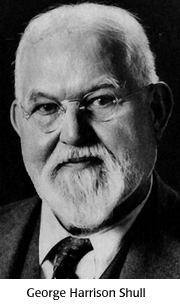Concept 12 Evolution begins with the inheritance of gene variations.

 Charles Darwin changed the world with his theory of evolution. This theory also provided the impetus for scientists to reexamine the question of heredity and inheritance, leading to the rediscovery of Mendel's laws and the evolution of the field of genetics. George Shull worked at the Station of Experimental Evolution. He used genetics to improve agricultural yields in corn and other crops.
Charles Darwin changed the world with his theory of evolution. This theory also provided the impetus for scientists to reexamine the question of heredity and inheritance, leading to the rediscovery of Mendel's laws and the evolution of the field of genetics. George Shull worked at the Station of Experimental Evolution. He used genetics to improve agricultural yields in corn and other crops.
George Harrison Shull (1874-1954)

George Shull was born on a farm in Clark County, Ohio, and his knowledge of plants and hybrids came at an early age. Shull's father was a farmer and his mother was an amateur horticulturist. Being needed on the farm, Shull's early formal education was sporadic. However, it was supplemented by intense home study such that by 1892, he was teaching public school, and attending Antioch College.
In 1901, he graduated from Antioch, and went to the University of Chicago to do graduate work. With his knowledge of botany and experience with farming practices, Shull passed a Civil Service exam, and was appointed as Botanical Assistant at the U. S. National Herbarium. He also worked at the U. S. Bureau of Plant Industry as a Botanical Expert examining the flora and fauna of Chesapeake Bay and Currituck Sound. The data he collected during this time was to comprise his Ph.D. thesis. However, Shull had become interested in the statistical analysis of variation in plants. He contacted Charles Davenport at the Station of Experimental Evolution, and in 1904 was appointed to be in charge of plant work at the Station. Shull published his uncompleted Ph.D. thesis as a paper, and went to Cold Spring Harbor.
At Cold Spring Harbor, Shull studied and bred a large variety of plants, for example, the evening primrose (Hugo de Vries' favorite species), shepherd's purse, corn and peas. He published many papers on his observations of plant traits and inheritance. In 1905, he began work on corn, maize, with the intent of examining the quantitative inheritance of corn traits. Following Mendel's example, Shull obtained pure-bred lines of corn through self-pollination. The pure-bred lines were less vigorous and productive, but when he crossed the pure-bred lines, the hybrid yields were better than any of the parents or those pollinated in the open fields. He immediately recognized the potential for using this strategy to improve crop yields. By the 1930's and 40's, most farms were growing the hybrid stocks, and improved yields contributed greatly to the war effort and the rehabilitation of post-war Europe.
In 1915, Shull accepted a professorship at Princeton University. At his instigation, Princeton University Press began the publication of a new journal, Genetics. Shull was the managing editor for ten years. Genetics is still one of the top international science journals.
Shull retired in 1942. He and his wife spent most of their twilight years with their children and grandchildren.


Charles Darwin's maternal grandfather was Josiah Wedgwood (1730-1795) who founded the famous Wedgwood Pottery company.

If evolution is an adaptation of a species to its environment, why do "bad" traits still exist?
 Children resemble their parents.
Children resemble their parents. Genes come in pairs.
Genes come in pairs. Genes don't blend.
Genes don't blend. Some genes are dominant.
Some genes are dominant. Genetic inheritance follows rules.
Genetic inheritance follows rules. Genes are real things.
Genes are real things. All cells arise from pre-existing cells.
All cells arise from pre-existing cells. Sex cells have one set of chromosomes; body cells have two.
Sex cells have one set of chromosomes; body cells have two. Specialized chromosomes determine sex.
Specialized chromosomes determine sex. Chromosomes carry genes.
Chromosomes carry genes. Genes get shuffled when chromosomes exchange pieces.
Genes get shuffled when chromosomes exchange pieces. Evolution begins with the inheritance of gene variations.
Evolution begins with the inheritance of gene variations. Mendelian laws apply to human beings.
Mendelian laws apply to human beings. Mendelian genetics cannot fully explain human health and behavior.
Mendelian genetics cannot fully explain human health and behavior.